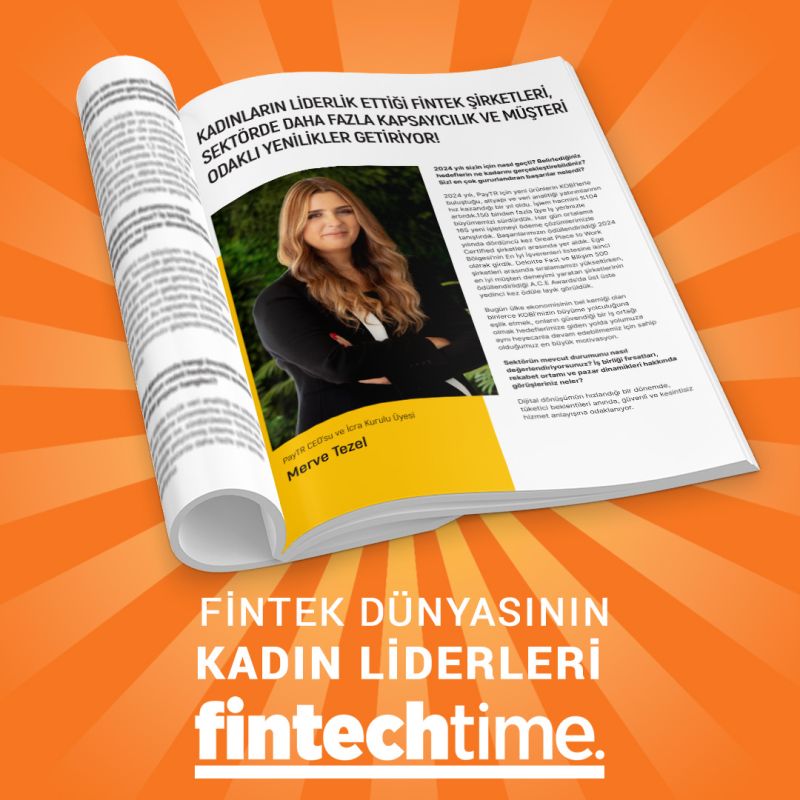Women-led fintech companies are bringing more inclusivity and customer-centric innovations to the industry!
Our CEO Merve Tezel talked about PayTR’s new term projects in the March issue of FinTechTime, which features strong female leaders in the sector.

How was 2024 for you? How much of the goals you set were you able to achieve? What were the achievements that made you most proud?
2024 was a year in which PayTR introduced new products to SMEs and accelerated its infrastructure and data analytics investments. We increased transaction volume by 104%. We continued our growth with more than 150 thousand merchants. We introduced our payment solutions to an average of 165 new businesses every day. In 2024, when our achievements were rewarded, we were among the Great Place to Work Certified companies for the fourth time. We ranked second in the list of the Best Employers in the Aegean Region. While increasing our ranking among Deloitte Fast and Informatics 500 companies, we were awarded for the seventh consecutive year at the A.C.E Awards, which recognizes companies that create the best customer experience. Today, accompanying the growth journey of thousands of SMEs, which are the backbone of the country’s economy, and being their trusted business partner is the greatest motivation we have to continue on our way to our goals with the same enthusiasm.
How do you assess the current state of the sector? What are your views on cooperation opportunities, competitive environment and market dynamics?
In a period of accelerating digital transformation, consumer expectations focus on instant, secure and uninterrupted service. The necessity to record high-value transactions as the use of cash decreases, the tendency of businesses to maintain their presence in marketplaces on their own e-commerce platforms and the widespread use of mobile payments increase the demand for fintechs. PayTR has been supporting the transformation and growth of SMEs for 15 years with its integrated solutions that enable payments from all cards. According to the research we conducted last year on POS usage habits, reliability and communication are decisive in fintech choices. SMEs prefer accessible payment institutions that can take action according to their needs and respond quickly to their questions.
Which priorities are on your current agenda? Which projects stand out among your near and long-term goals?
In addition to our products and services, we continue to invest in security and infrastructure without slowing down this year. As a result of the launch of our two new data centers in 2024, the accessibility rate of our systems reached 99.93 percent. After NeoPOS, which converts mobile phones or tablets with Android operating systems into POS devices, we launched VUK 507-compliant NeoPOS+, which can issue e-documents. We introduced PayTR Physical POS to businesses that grow their business online with PayTR Virtual POS. In a period rapidly shaped by digital transformation and technological innovations, where consumer expectations are centered around the understanding of ‘instant, secure and uninterrupted’ service, multi-channel payment solutions and artificial intelligence-supported security solutions will stand out. Strategic collaborations and data analytics-based solutions will both support SMEs’ digital transformation journey and increase financial inclusion.
How do you think the global fintech ecosystem will evolve? Which technologies and trends will shape our lives in the coming period?
In 2025, payment infrastructures are expected to become personalized as consumer expectations change. Strategic collaborations and data analytics-based solutions will support the digital transformation of SMEs while increasing financial inclusion. Multi-channel payment systems, AI-powered security solutions and fast, seamless payment experiences will be the cornerstones of the fintech ecosystem. PayTR will continue to offer innovative payment solutions by increasing its technological investments in 2025.
How did you step into the fintech sector? What motivated you on this journey?
After completing my education, I started my career in banking during the growth period of retail banking and payment systems. And I worked on payment systems for many years. After serving as the General Manager of Visa Turkey for more than 10 years, our paths crossed with PayTR two years ago, at a time when the growth of the fintech sector was accelerating. The world of banking and finance was already a corporate and egalitarian field where women could easily show their presence and hold important positions throughout my career. The number of women leading companies is increasing every year, especially in fintech, where the founders are predominantly men due to its technology and software-oriented nature.
What vision do women leaders bring to the fintech industry? How do you think different perspectives create change in the sector?
Many studies have shown that companies with women leaders have increased productivity, leading fintechs to find a balance in their organizational structures. The increase in women leaders not only brings a polyphonic perspective to the sector, but also creates examples in the sector, increases the participation of women in these sectors and contributes to the quality employment of women. In workplaces where polyphony and equality are observed and employee satisfaction is prioritized, all leaders, men and women, play a critical role in creating sustainable business models by better understanding the needs of customers and employees.
What opportunities do you see for women entrepreneurs in fintech? Do you have practices in your company that support this potential?
The active fintech sector offers great opportunities for women entrepreneurs. Digital payment systems, e-commerce solutions and financial management tools make it easier for women entrepreneurs to grow their businesses. PayTR has been a reliable business partner to thousands of women entrepreneurs for many years. We provide all kinds of support to create a supportive ecosystem for their career journeys. At PayTR, we take various actions such as developing mentorship programs for women leaders, strengthening collaborations, and providing new career opportunities for female employees within the company. This year, we will also have some projects in the field of financial literacy. Thanks to the conveniences provided by financial technologies, we support more women to be involved in commercial life in every aspect.
What are your suggestions for creating a more inclusive and supportive work environment for women?
Increasing training, mentoring and career opportunities is of great importance for women to be more visible in the business world. A fair working environment, equal pay policies, and ensuring that women can continue their careers without being interrupted due to motherhood and family life form the basis of the company’s corporate values and give the right direction to sustainability policies.
Do you have projects to increase diversity in management? If so, how do you evaluate their impact on the sector?
As PayTR, we care about having more women in our management team and technology teams. We care about diversity and inclusion in the work environment and leadership. In the last three years, we have increased the number of female employees by 133 percent by supporting the employment of women in both management and technology teams. I think that in every environment where there is equal opportunity, it is important for organizations to be successful that both genders complement each other and progress towards their goals. Of course, diversity should not be viewed only on the axis of men and women. With the recent development of hybrid working opportunities, the geographical diversity of our employees has increased. At the same time, in terms of experience, we have recently added managers with much longer years of experience and who will contribute to the fintech sector in areas such as banking and e-commerce.
Do you have an experience that affected you a lot in your leadership journey? What was the most important lesson you learned from this process?
Leadership requires continuous learning and adaptation to change. From the very beginning, I made a special effort to learn what I did not know in every position I held, to understand what the functions outside my own field were doing, and to understand the kitchen of the business very well. Thus, I tried to see the big picture outside of my own field and at the same time to be a candidate to manage those new businesses in new areas that the company needed. Although there are of course many experiences in my development, to summarize, the most effective thing was actually going out of my comfort zone a little bit on a regular basis. As the leadership adventure progressed further, I realized the importance of a strong team and a strong team spirit with a clear character that supports it. I think it is not possible to achieve sustainable success without a team. For me, leadership is a pleasant journey that I make by sharing knowledge and success with the people I work with on this journey. For me, the success we achieve on this journey is measured not only by numbers, but also by the change in the lives you touch, both inside and outside the company.
What can be done to make women more visible in fintech? What advice would you give to young women?
For women who want to pursue a career in technology and finance, there are a lot of career opportunities in the banking and financial technology ecosystem; the sector is growing very quickly and there is definitely a high demand for quality, creative and reliable employees. I would recommend that they start by starting at an organization where there are opportunities and experienced managers, and work in a way that is always curious, inquisitive, and has time for self-development and following examples from around the world. I recommend that they follow online training and development opportunities organized both in Turkey and abroad. It is important for them to improve their English, either at school or through their own means – our business has many foreign business partners, even in Turkey, so it is essential to be able to take a wider responsibility in this regard and to be able to follow the world. In a world where access to information and education is so easy, it all starts with personal development.
How do you think a solidarity network can be established among women leaders? What would be the impact of this solidarity on the sector?
There are very good examples of this in the world. In our country, I see that there are valuable organizations that bring leaders together. Expanding the impact of these networks can facilitate the sector’s access to talent. As the number of women increases within companies, informal networks and mentoring activities are already developing.
How do you define success as a leader? What is the big goal you want to achieve in the future?
Success is not only measured by financial results. True success is growing with your team, creating value for customers and creating a positive change in the lives you touch. At this point in my leadership journey, my priorities are to successfully manage change, to develop the managers around me, to accomplish greater things and to support Turkey to set an example for the world in the field of fintech. As PayTR, our goal is to be one of the strong stakeholders of digital transformation with our new generation payment solutions and services to support the growth of SMEs.
Popüler Ürünler
Benzer Blog İçerikleri İlginizi Çekebilir

What is Virtual POS? How to Get Virtual POS?
Virtual POS systems are one of the most important motivations supporting the increasing e-commerce volume. Virtual POS (

Virtual POS Error Codes and Solutions
Virtual POS error codes prevent e-commerce activities from continuing uninterruptedly. It also creates a loss of reputat

10 Profitable Business Ideas for Those Who Want to Start Their Own Business
No matter how difficult economic conditions become, many people dream of starting their own business. Young, women, midd





